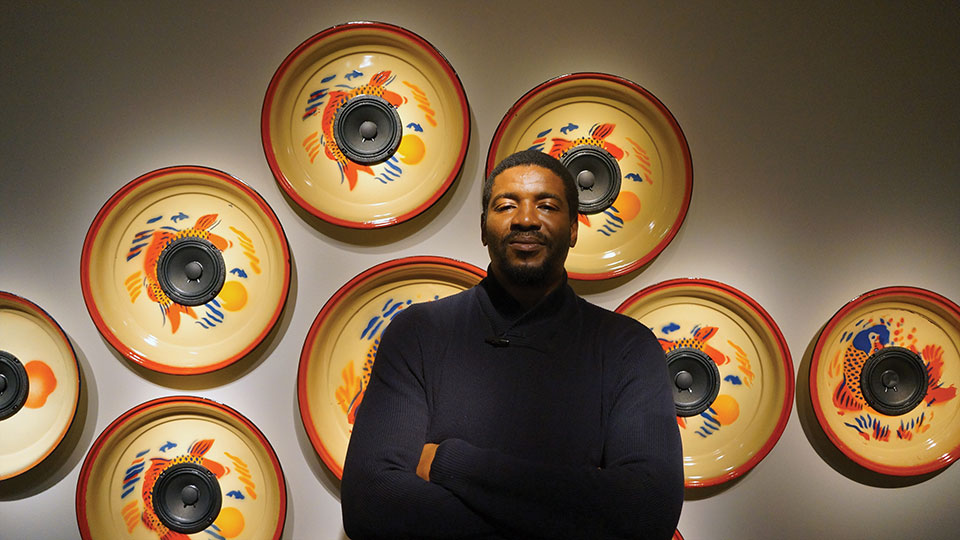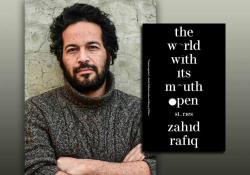Food and Migration: A Conversation with Artist Emeka Ogboh (Recipe Included)

Born in Enugu, Nigeria, and now dividing his time between Lagos and Berlin, Emeka Ogboh is an artist exploring migration, globalization, and colonialization through sound and food. He is co-founder of the Video Art Network Lagos and in 2016 received the Bottcherstraße Prize in Bremen.
Michelle Johnson: As an artist, you’ve explored migration through food and its metaphors. For your 2015 exhibition No Food for Lazy Man, you even created your own beer to tell the story of African migrants living in Germany. As you work more and more with food, what are you discovering within the context of migration?
Emeka Ogboh: Food is certainly an interesting and compelling medium to explore migration with. In investigating food and foodways of the immigrant, one begins to get a picture of how immigrants live and adjust to their new environment and how they deal with being far away from home. How do immigrants find authentic food, and how do they cope with limited or no access to these foods? This accessibility reflects the conditions of living abroad, where food goes beyond satisfying hunger and providing nourishment but also acts as the vehicle for one to remember home, re-create memories, and adjust to a new environment. As an immigrant, one becomes more conscious of food, its significance, and its social and therapeutic function.
Migration changes how we view food; whether eating to remember home or eating to connect with a new place, food becomes an embodiment of cultural connections.
Johnson: In a video for Studio Olafur Eliasson, you touch on fusion. Where do you find fusion fitting into the work that you’re doing as an artist exploring migration with food?
Ogboh: Fusion is one of best ways to discuss assimilation, how we absorb and integrate into a culture different from ours, and what comes out of this process. When we substitute certain ingredients with others, because of not having access to the food we are familiar with, or simply due to curiosity and the need to experiment, we end up creating something new from the resultant combination.
Being unable to have full access to the food one is used to, there is an inclination to try substituting with what is found locally. But for this to occur, one has to explore the local cuisine and delicacies to be able to determine what combinations could work, and in this process experiment with new tastes and flavors. So I collaborate with different chefs and individuals who cook to create food that explores two different cultures, and, in the process of doing so, we have conversations on food, foodways, and any other topic that comes up. Food then becomes a point of departure into a wider discourse that centers around sociopolitical issues, opening new perspectives and insights into two different cultures.
Johnson: Is there a particular recipe that illustrates this connection between food and migration?
Ogboh: The Nigerian soups and fufu are typical examples of foods that have been influenced by migration. The cuisine has evolved into different variations because of the limited access while abroad to the ingredients used in the preparation of the food. The soups are special sauces that are usually eaten with fufu; fufu being the typical name for food (mainly carbohydrates) that you swallow. Living abroad, with little or no access to the special ingredients used in the preparation of the food, the fresh vegetables used in the soups, and the “swallows” that accompany these soups, have been adapted to what one can source locally. Spinach, which is commonly found everywhere, has proven to be one of the best alternatives to fresh Nigerian vegetables. The “swallows,” which are usually made from cassava, corn, yam, and plantains, are now being replaced with oats, wheat, and potato.
That said, the first soup-related recipe that comes to mind would be egusi (melon seed) soup. The egusi soup is a sauce thickened with ground egusi (melon seeds) and cooked with fresh vegetables. It is probably the most popular Nigerian soup across the different tribes in the country. To make egusi soup, you need the egusi—there is no substitute for this—but the fresh vegetables in the soup can be replaced with fresh spinach.
Johnson: What are a few of your favorite books, films, pieces of art, podcasts, etc. about food?
Ogboh:
Film and Television:
Cooked
Chef’s Table
Maggi Kitchen (Nigerian TV food show)
Books:
Long Throat Memoirs: Soups, Sex and Nigerian Taste Buds, by Yemisi Aribisala
Salt, Fat, Acid, Heat: Mastering the Elements of Good Cooking, by Samin Nosrat
Neurogastronomy: How the Brain Creates Flavor and Why It Matters, by Gordon M. Shepherd
Instagram Follows: #africanfood, #africancuisine, #professionalchefs, #gastroart, #craftbeer, #nigerianfood, #naijafood, #theartofplating
Podcasts: Bon Appétit Foodcast and The Food Chain on the BBC

Recipe for Egusi Soup
INGREDIENTS
2 cups cut pumpkin leaves (replace with spinach)
4 cups ground egusi (melon seeds)
1 cup palm oil
cooked meat or fish
6 cups meat or fish stock
salt to taste
ground crayfish to taste
onions and scotch bonnet peppers
MAKE THE SOUP
Heat the palm oil in a large pot on medium heat for at least a minute.
Add the stock and set on low heat to simmer.
Add the egusi paste mixture, with the blended onions and peppers, into the stock and let simmer for 20 minutes.
Add the meat or fish.
Add cut-up spinach leaves.
Stir and cook for about 20 minutes, tasting and adjusting the seasoning.
INGREDIENTS FOR “SWALLOW”
2 cups oats
3 cups warm water
INSTRUCTIONS
Pour the oats and warm water into the blender and blend till smooth.
Pour into a pot, on medium heat, and stir continuously until it thickens into a doughlike texture.
Allow to cool and then serve with the soup.














